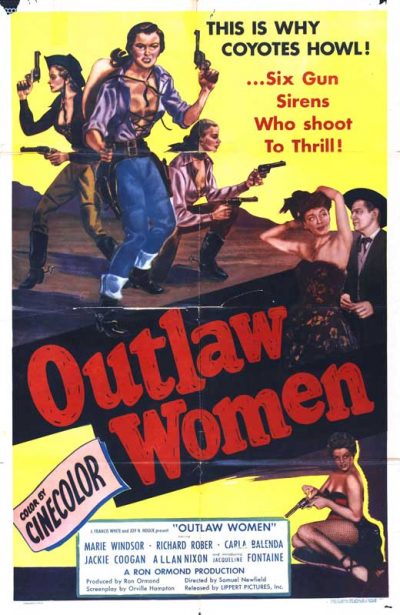★★½
“In which Iron Mae eventually breaks.”
 The city of Silver Creek is on the way out, and many of its inhabitants are leaving, including town doctor Bob Ridgeway (Nixon). Originally heading to Kansas City, he is convinced at gunpoint to take up a position instead in “Las Mujeres.” That’s Spanish for “The women,” and is an appropriate name since the place is a gynocratic society, where the ladies are in charge. Top of the heap is Iron Mae McLeod (Windsor), who runs the local saloon and ensures that the the other women in the town are kept safe from exploitation. She does, however, have to navigate the straits between aspirational gambler Woody Callaway (Rober) and outlaw Frank Slater. Ridgeway, meanwhile, because the target of affection for both Beth Larrabee (Balenda), one of Mae’s enforcers, and her big sister and star of the saloon’s show, Ellen. But when all of Mae’s money is about to be transferred out of Silver Creek, and becomes a target for Slater and his gang, romance has to take a back seat.
The city of Silver Creek is on the way out, and many of its inhabitants are leaving, including town doctor Bob Ridgeway (Nixon). Originally heading to Kansas City, he is convinced at gunpoint to take up a position instead in “Las Mujeres.” That’s Spanish for “The women,” and is an appropriate name since the place is a gynocratic society, where the ladies are in charge. Top of the heap is Iron Mae McLeod (Windsor), who runs the local saloon and ensures that the the other women in the town are kept safe from exploitation. She does, however, have to navigate the straits between aspirational gambler Woody Callaway (Rober) and outlaw Frank Slater. Ridgeway, meanwhile, because the target of affection for both Beth Larrabee (Balenda), one of Mae’s enforcers, and her big sister and star of the saloon’s show, Ellen. But when all of Mae’s money is about to be transferred out of Silver Creek, and becomes a target for Slater and his gang, romance has to take a back seat.
This was shot in Cinecolor, at a time (1952) when many more expensive productions were still in black and white. That helps up the production value, though it otherwise remains an obviously low budget approach. It’s a shame the makers didn’t quite use that freedom to make something truly subversive. The ending instead manages to be almost cringeworthily patriarchal – particularly following, as it does, a gun-battle in which we see, again, that firearms are the great equalizer, allowing Mae and her gals to play their part in holding off the outlaws. Up until this disappointing coda, it has been a fairly decent romp, with Windsor holding things together effectively. She gets good support from Balenda, as well as Maria Hart, playing bouncer Dora. She casually manages to judo-flip the fastest gun in Silver Creek, after he refuses to give up his gun, while simultaneously disarming him. Dora can also strike a match on her teeth, an impressive party trick for either sex.
Coming in at a brisk 75 minutes, it still manages to waste some precious time, on things like musical numbers by a barbershop quartet called The Four Dandies. tnd The film doesn’t delve into the implications of its idea as far it might. Despite the noble intentions of Mae, Las Mujeres seems little if any different from any other town in the wild West. Though that could be the point, I suppose. I did like the pointed way in which the system – in the form of male-only suffrage – is the tool used by Callway to dismantle Mae’s gynocracy. Though as noted, the ending manages to embarrass the entire film, effectively dismantling the strong portrayal of Mae which we had enjoyed to that point. That aside, there’s no denying the movie remains well ahead of its time, paving the way for probably better entries, such as Johnny Guitar and Woman They Almost Lynched, later in the decade.
Dir: Sam Newfield, Ron Ormond
Star: Marie Windsor, Richard Rober, Allan Nixon, Carla Balenda




